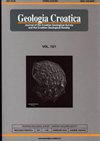On the origin of both a recent and submerged tombolo on Prvić Island in the Kvarner area (Adriatic Sea, Croatia)
IF 1.1
4区 地球科学
Q3 GEOLOGY
引用次数: 5
Abstract
This paper analyzes the origins of two tombolos (one recent and another fossil/submerged) on the southwestern coast of Prvic Island, which is located in the Kvarner area in the northeastern part of the Adriatic Sea. A recent tombolo on Cape Pipa was formed by the erosion of Quaternary deposits and Palaeogene siliciclastic rocks. The submerged tombolo is much bigger, clearly visible on the sea bed toward the southwest. The conditions for forming a submerged and recent tombolo have occurred during a slow rise and then stagnation of sea level of the Adriatic Sea in the Holocene. The sea flooded the fossil tombolo probably in the final part of a period of rapid sea-level rise at the beginning of the Holocene when a large proportion of the Quaternary sediments were eroded. Waves from the northwest (tramuntana) and southeast (jugo) refract and diffract around the tombolo. The nourishment of the beach body happens permanently on both sides of the cape. Accumulated sediments are protected by resistant rocky blocks of breccia on the peak of Cape Pipa, acting as a natural tombolo. Due to the fact that wave directions are perpendicular to the beach coastline, they do not generate longshore currents that would erode sediment in beach bodies around Cape Pipa. Therefore, the recent tombolo is probably stable in the present climatic and oceanographic conditions in the Kvarner area.关于Kvarner地区(克罗地亚亚得里亚海)Prvić岛上最近和被淹没的汤博洛的起源
本文分析了位于亚得里亚海东北部克瓦尔纳地区的普维奇岛西南海岸的两个汤博洛的起源(一个是最近的,另一个是化石/淹没的)。皮帕角最近的汤博洛是由第四纪沉积物和古近系硅化碎屑岩侵蚀形成的。被淹没的汤博洛要大得多,在西南方向的海床上清晰可见。亚得里亚海海平面在全新世缓慢上升然后停滞期间,形成了淹没的和最近的汤博洛。海水淹没了汤博洛化石,可能是在全新世初海平面快速上升时期的最后阶段,当时大量第四纪沉积物被侵蚀。来自西北部(tramuntana)和东南部(jugo)的波浪在汤博洛周围折射和衍射。海滩身体的营养永远存在于海角的两侧。堆积的沉积物受到皮帕角峰上的角砾岩的抵抗岩块的保护,起到了天然tombolo的作用。由于波浪方向垂直于海滩海岸线,因此不会产生侵蚀皮帕角周围海滩水体沉积物的沿岸流。因此,在克瓦尔纳地区目前的气候和海洋条件下,最近的汤博洛可能是稳定的。
本文章由计算机程序翻译,如有差异,请以英文原文为准。
求助全文
约1分钟内获得全文
求助全文
来源期刊

Geologia Croatica
GEOSCIENCES, MULTIDISCIPLINARY-
CiteScore
2.90
自引率
23.10%
发文量
35
审稿时长
>12 weeks
期刊介绍:
Geologia Croatica welcomes original scientific papers dealing with diverse aspects of geology and geological engineering, the history of the Earth, and the physical changes that the Earth has undergone or it is undergoing. The Journal covers a wide spectrum of geology disciplines (palaeontology, stratigraphy, mineralogy, sedimentology, petrology, geochemistry, structural geology, karstology, hydrogeology and engineering geology) including pedogenesis, petroleum geology and environmental geology.
Papers especially concerning the Pannonian Basin, Dinarides, the Adriatic/Mediterranean region, as well as notes and reviews interesting to a wider audience (e.g. review papers, book reviews, and notes) are welcome.
 求助内容:
求助内容: 应助结果提醒方式:
应助结果提醒方式:


